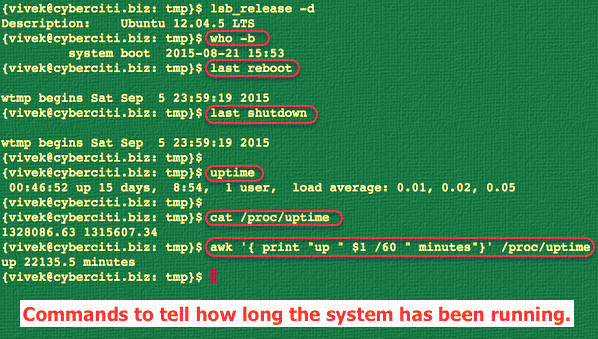5.4 KiB
Linux Server See the Historical and Statistical Uptime of System With tuptime Utility
You can use the following tools to see how long system has been running on a Linux or Unix-like system:
- uptime : Tell how long the server has been running.
- lastt : Show the reboot and shutdown time.
- tuptime : Report the historical and statistical running time of system, keeping it between restarts. Like uptime command but with more interesting output.
Finding out the system last reboot time and date
You can use the following commands to get the last reboot and shutdown time and date on a Linux operating system (also works on OSX/Unix-like system):
## Just show system reboot and shutdown date and time ###
who -b
last reboot
last shutdown
## Uptime info ##
uptime
cat /proc/uptime
awk '{ print "up " $1 /60 " minutes"}' /proc/uptime
w
Sample outputs:
Fig.01: Various Linux commands in action to find out the server uptime
Say hello to tuptime
The tuptime command line tool can report the following information on a Linux based system:
- Count system startups
- Register first boot time (a.k.a. installation time)
- Count nicely and accidentally shutdowns
- Average uptime and downtime
- Current uptime
- Uptime and downtime rate since first boot time
- Accumulated system uptime, downtime and total
- Report each startup, uptime, shutdown and downtime
Installation
Type the following command to clone a git repo on a Linux operating system:
$ cd /tmp
$ git clone https://github.com/rfrail3/tuptime.git
$ ls
$ cd tuptime
$ ls
Sample outputs:
Fig.02: Cloning a git repo
Make sure you've Python v2.7 installed with sys, optparse, os, re, string, sqlite3, datetime, disutils, and locale modules.
You can simply install it as follows:
$ sudo tuptime-install.sh
OR do a manual installation (recommended method due to systemd or non-systemd based Linux system):
$ sudo cp /tmp/tuptime/latest/cron.d/tuptime /etc/cron.d/tuptime
If is a system with systemd, copy service file and enable it:
$ sudo cp /tmp/tuptime/latest/systemd/tuptime.service /lib/systemd/system/
$ sudo systemctl enable tuptime.service
If the systemd don't have systemd, copy init file:
$ sudo cp /tmp/tuptime/latest/init.d/tuptime.init.d-debian7 /etc/init.d/tuptime
$ sudo update-rc.d tuptime defaults
Run it
Simply type the following command:
$ sudo tuptime
Sample outputs:
Fig.03: tuptime in action
After kernel upgrade I rebooted the box and typed the same command again:
$ sudo tuptime
System startups: 2 since 03:52:16 PM 08/21/2015
System shutdowns: 1 ok - 0 bad
Average uptime: 7 days, 16 hours, 48 minutes and 3 seconds
Average downtime: 2 hours, 30 minutes and 5 seconds
Current uptime: 5 minutes and 28 seconds since 06:23:06 AM 09/06/2015
Uptime rate: 98.66 %
Downtime rate: 1.34 %
System uptime: 15 days, 9 hours, 36 minutes and 7 seconds
System downtime: 5 hours, 0 minutes and 11 seconds
System life: 15 days, 14 hours, 36 minutes and 18 seconds
You can change date and time format as follows:
$ sudo tuptime -d '%H:%M:%S %m-%d-%Y'
Sample outputs:
System startups: 1 since 15:52:16 08-21-2015
System shutdowns: 0 ok - 0 bad
Average uptime: 15 days, 9 hours, 21 minutes and 19 seconds
Average downtime: 0 seconds
Current uptime: 15 days, 9 hours, 21 minutes and 19 seconds since 15:52:16 08-21-2015
Uptime rate: 100.0 %
Downtime rate: 0.0 %
System uptime: 15 days, 9 hours, 21 minutes and 19 seconds
System downtime: 0 seconds
System life: 15 days, 9 hours, 21 minutes and 19 seconds
Enumerate each startup, uptime, shutdown and downtime:
$ sudo tuptime -e
Sample outputs:
Startup: 1 at 03:52:16 PM 08/21/2015
Uptime: 15 days, 9 hours, 22 minutes and 33 seconds
System startups: 1 since 03:52:16 PM 08/21/2015
System shutdowns: 0 ok - 0 bad
Average uptime: 15 days, 9 hours, 22 minutes and 33 seconds
Average downtime: 0 seconds
Current uptime: 15 days, 9 hours, 22 minutes and 33 seconds since 03:52:16 PM 08/21/2015
Uptime rate: 100.0 %
Downtime rate: 0.0 %
System uptime: 15 days, 9 hours, 22 minutes and 33 seconds
System downtime: 0 seconds
System life: 15 days, 9 hours, 22 minutes and 33 seconds
via: http://www.cyberciti.biz/hardware/howto-see-historical-statistical-uptime-on-linux-server/


